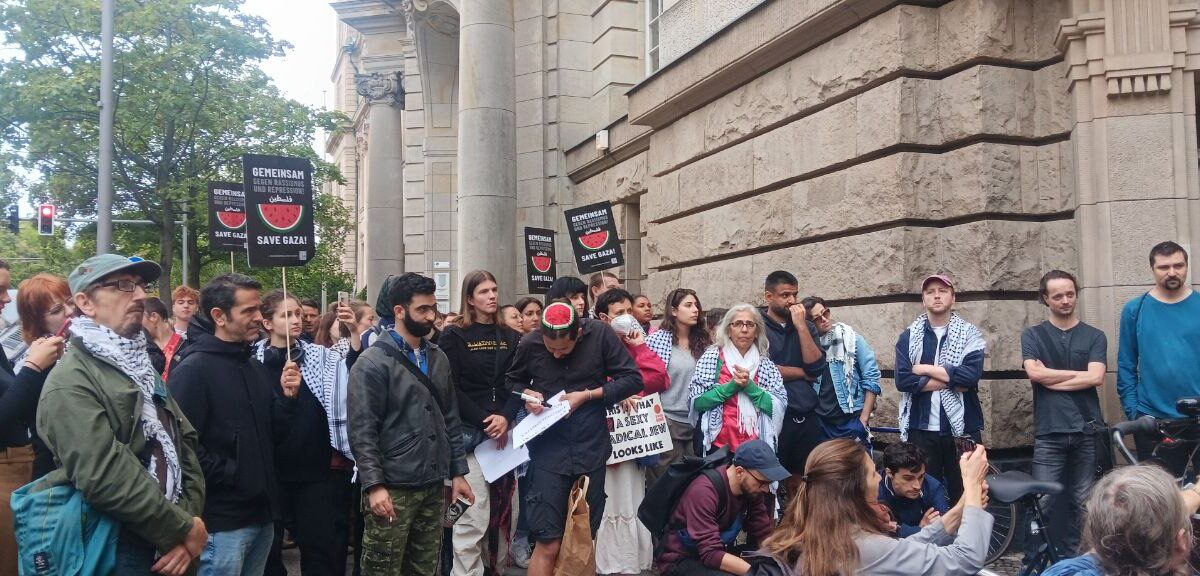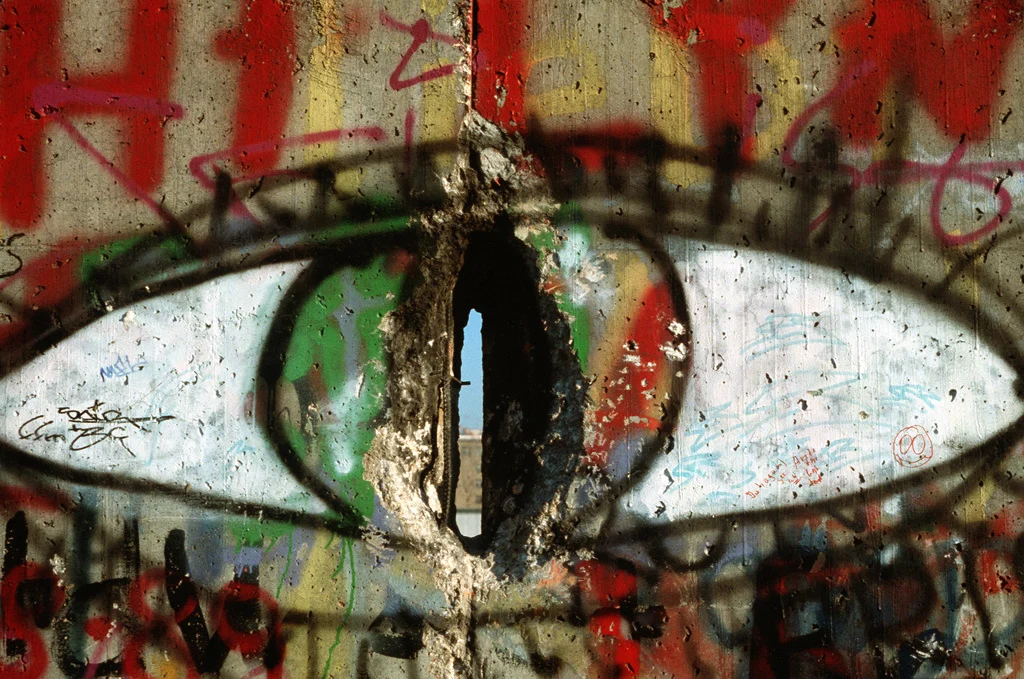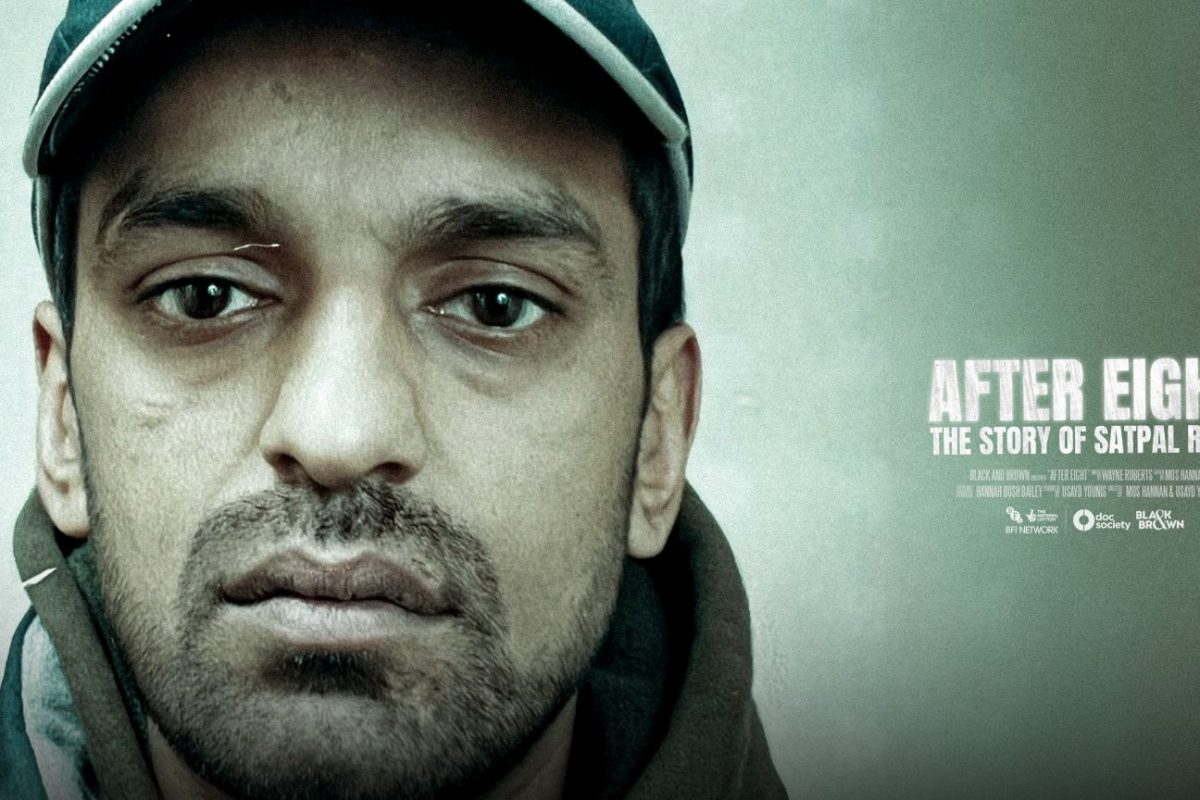Hi Nadija. Thanks for talking to us. Could you start by briefly introducing yourself? Who are you and what do you do?
My name is Nadija Samour. I work as a criminal defence lawyer, and I am also the senior legal advisor for the European Legal Support Center (ELSC), which stands in solidarity with Palestine advocates and Palestinian rights, and offers legal support.
We’re here today outside the Tiergarten courthouse. Can you explain what just happened?
There was a court hearing scheduled for my client, who is accused of “using propaganda of a terrorist organisation”. This is the legal code. What they mean is she has used or shouted the slogan, “from the river to the sea, Palestine will be free”.
The accusation is that this slogan is owned by Hamas, and that when you use it publicly, it’s propaganda for a banned or terrorist organisation. Of course, this is ridiculous, because the slogan is much older than Hamas, and the Federal Ministry of the Interior has absolutely no proof that it is a Hamas slogan. There is no proof because it’s just not true.
And what happened today? [this interview took place on 22nd August, 2024]
My colleague, Alexander Gorski, and I arrived with our client. We were ready to fight off this accusation, but the judge told us that he had not allocated enough time for this trial. He said he wasn’t aware that there would be so much attention and so many people would come.
We had prepared a proper defence, with applications for witnesses and expert opinions, and he acted surprised. But every judge knows that the most minor accusation at court needs at least an hour. The new date will be on 11th November. I really hope a lot of people will show up again, just like today.
We believe that he didn’t want to face it, and that there was a lot of press attention. He wasn’t very well prepared. But if you’re a judge, and you follow the public debate and read jurists’ magazines, you would know that this is a controversial question.
I was just talking to someone who asked: does the judge not read newspapers?
Exactly. That is ridiculous. I believe that he’s scared. Before the trial, he already said, “I won’t make a decision on this. Let the higher courts decide”. It’s a mixture of cowardice and laziness.
This is the second case in Berlin around “From the River to the Sea”, and the second time there’s been a protest outside. What is the role of the protests in affecting what happens?
I think it’s very important. It’s important for a client to experience solidarity on an interpersonal level, but it’s also important because the protests draw international interest into Germany.
Some weeks ago, I was in Geneva at the UN on a trip organised by Amnesty International. There was a special session on the human right of freedom of speech and freedom of assembly. I was there with some students from the US who were active in the encampments. We met people from the office of the Higher Commissioner for Human Rights and the deputies of some countries. And everyone was asking me: “What the hell is happening in Germany?”
If it wasn’t for these demonstrations and the brave and stubborn way in which people keep on protesting, we wouldn’t gain this attention.
And yet, despite the protests, a lot of people aren’t really aware of everything that’s going on. I was talking to two women outside the court today, and they said, of course they’re here, but they didn’t know that there are other similar cases. So firstly, how many other cases are there?
I would say in the hundreds. Not all of these cases have reached court level yet. The police start investigating, they give the file to the prosecutor, and the prosecutor decides whether to drop the case. Most of these cases are still with the prosecutor. But to my knowledge, there are around ten cases at court level already, where the prosecutor has decided to file.
That’s just for Berlin. I don’t have the numbers for other places, but they must be in the hundreds, as this is a slogan that is really characteristic for the Palestine demonstrations. But people are not giving in. They’re not letting the slogan go. And I think this is very good.
How do people find out about other cases?
The ELSC is trying to follow up on all the cases. But we don’t know about them all. Not everyone is organised or part of a political group that knows how to deal with the repression and reach out to us. If you want change, then you have to do it collectively. If people do have court cases, they should contact the ELSC so we can coordinate support.
Why has the phrase “From the River to the Sea” become so important in Germany recently?
There is an official reasoning, and then there’s my interpretation. Officially, Germany felt they needed to react after 7th October. They see themselves as a close ally of Israel. And then there’s this spooky term, “Staatsräson”.
They felt they had to do something, so they banned two organizations that do not have a lot to do with each other. One is Hamas, the other is Samidoun. There are 70 pages explaining why they are banned, and in both cases they say they use the slogan as a trademark.
The German government basically invented the connection between the slogan and the banned organization. In the case of Hamas, they say the words are in the Charter of 2017. This is ridiculous, because they aren’t using it as a slogan. They are using it as a way of describing the territory of Palestine.
This is the official reasoning. But I would say that they needed a tool to oppress and repress the demonstrations. At the beginning, they tried to ban the demonstrations outright. They had trouble because the constitution doesn’t really allow that, and international pressure was mounting. People saw that Germany was not respecting basic democratic and fundamental rights.
So they said, “Okay, you know what? We won’t ban the demonstrators, but we’ll annoy them to hell. Let’s confront them with arrests”. These arrests were brutal – people have been badly hurt when they were arrested. So they said: “Let’s create some images for the press about those barbarities, and use this slogan to criminalize the demonstrations, if we can’t ban them”.
When you’re talking about “they”, who is giving the orders here?
It’s the Federal Ministry for the Interior. It’s basically the government. They have invented the interpretation of this slogan. The judiciary is technically independent and has said in many cases either that the slogan is not Hamas propaganda, or at least that it’s not clear. The judiciary has spoken, but the government doesn’t really care, because they have another agenda.
This agenda is not only to criminalize and harass those demonstrations. It’s also to prepare for mass deportations, as Scholz said last year. And what better reason you have for mass deportations than young Arab and Muslim men who have allegedly committed an antisemitic crime? This is a red carpet for deportation orders.
More people were arrested outside the court today. How much do we know about what happened and why it is happening?
I think the majority of today’s cases are because of the slogan. People know exactly what they are risking, but they do it because they are convinced, just like me, that this is really not a criminalized slogan, and we have to push for it.
In October, when the demonstrations were banned, people didn’t care. They were brave, they were courageous, they were stubborn, and they kept on demonstrating, until they broke the ban and enforced their rights.
How can you explain that courts in Mannheim say that “From the River to the Sea” is okay, and courts in Berlin just fined someone €600?
Unfortunately, I feel that the judiciary in Berlin is always a bit more close to the government. You can also see this with the cases related to the demonstration bans. They are sent to the Administrative Court, which always rules in favour of the state on this topic. This is really worrying.
I believe that there’s a technical difference as well. The case on the 6th of August used another code – condoning criminal acts. It was a very cheap trick. They said, “you used the slogan before the official ban, but you used the slogan in proximity to 7th October. This means there is absolutely no other interpretation possible than you are in favour of the deeds of 7th October”.
This won’t hold. It is a baseless kind of argumentation. In today’s case we had another code of using propaganda.
Do you think it’s significant that they’re using different codes in different cases? I get the feeling they’re seeing what they can get away with and what they can’t.
I see it like that as well. The further away we are from 7th October, the less they can use the claim of proximity. I think this is a one-off judgment, and that most of the rest of the cases will focus on propaganda of banned and terrorist organizations.
There has also been a push to criminalise the symbol of the red triangle. Why are they doing this, and what’s the chance of it becoming a law?
The red triangle is being discussed as a symbol of Hamas, and it’s also being discussed as a symbol of calling for violence or marking enemies. At the same time, the red triangle has many more meanings, for example, the Communists who were deported to the concentration camps. The VVN-BdA (main German anti-Fascist organisation) is still using it today.
And there are monuments all over Berlin with a red triangle
Exactly. So again, you will create a gray zone, where they will always say, “well, it really depends on the context.” This will give the police the powers to arrest people, to hurt people, to harass people, to intimidate people. They always create this kind of situation where the cops are free to act as they want, and then perhaps later, after you lost a lot of time and money and nerves in court, they might drop it.
But they are facing real formal difficulties in codifying this. So they tried the smart trick of saying that a demonstration has an order with limitations. You cannot do this. You cannot say that. You cannot call for violence. And so they say: “Whoever uses the red triangle is calling for violence, and therefore is violating the orders of the demonstration”. It’s not banned as the red triangle, but it’s interpreted as calling for violence.
So theoretically, somebody could be arrested for carrying a VVN flag, although the VVN have actually taken a very pro-Israel position?
Ah, you are missing an important point, which is racism. When they talk about context, what they really mean is: what does the person who is carrying or using the red triangle look like? The context that matters is the prosecution of anything related to Palestine or anti-colonialism. Let’s not assume that the authorities will act stupid and arbitrarily, but I think they know exactly how to target the right people.
Let’s try and end on an optimistic note. Palestinians, and other supporters of Palestine are being sent to court, they are being attacked by the police. In official German politics, they don’t see much support. Where can they find hope that things could change and that they can win justice?
We are winning already. It doesn’t always feel like this, but I think that we are already winning. Look at the amount of people talking about Palestine, the people showing up for Palestine, the people being so courageous and not backing down for Palestine.
I’ve been living in Berlin for more than 20 years, and I’ve never seen such solidarity since perhaps the last Iraq War in 2003. I studied at the HU. I’m not particularly proud of it, because it’s a very reactionary law school. But it used to be impossible to talk about Palestine before, as the AstA (student council) used to be so anti-Deutsch.
Now, at all universities in Berlin, people are organizing for Palestine. Artists are coming out for Palestine. School children are coming out for Palestine. We still lack the trade unions, but we’re working on it. This is unprecedented in my memory. I don’t know what it was like in the 70s, but that’s at least what I can tell you.
Why do you think things are changing?
The contradictions are so obvious, the confrontation is so clear, that we’re not only talking about a genocide. This is really bad enough, but we’re talking about a crystal clear complicity – of the German state, German industry, the German ruling class – in this. It’s even a partnership perhaps.
At the same time we have the hypocritical double standards and the readiness of Germany to crack down on their own constitution, on their own promise to respect international law, according to their own standards – just to support this genocide. This obvious contradiction is what people are reacting to. They don’t want to be alienated any more from their ability to act.
If people read what you say and are horrified by what’s going on, what can they do as individuals?
Individuals cannot do much. You have to organize. Reach out to the organization that you align with most. The Left Berlin is a very good one, a strong and important one. But also, if you are a student, reach out to your student group, if you are a worker, make some change in your trade union. You can do anything, anywhere, also in your neighbourhood.
You can reach out to the next pro-Palestine organisation. You can do things together collectively much better. It’s also much more fun, and you’re protected much more than as an individual. If you’re not there yet, keep talking about Palestine. Stay informed. Check out the European Legal Support Centre for the struggle against repression. Check out the BDS campaign.
This is something that people do on an individual level. The real force is when you do it as a collective, but this is something very practical. Boycott, divest, and sanction Israel for their human rights abuses against Palestinians.
And of course, there’s the postponed case on 11th of November.
Exactly, and the court is public. People are welcome to join. The case starts at 9 o’clock at the Amtsgericht Tiergarten on Turmstraße.




